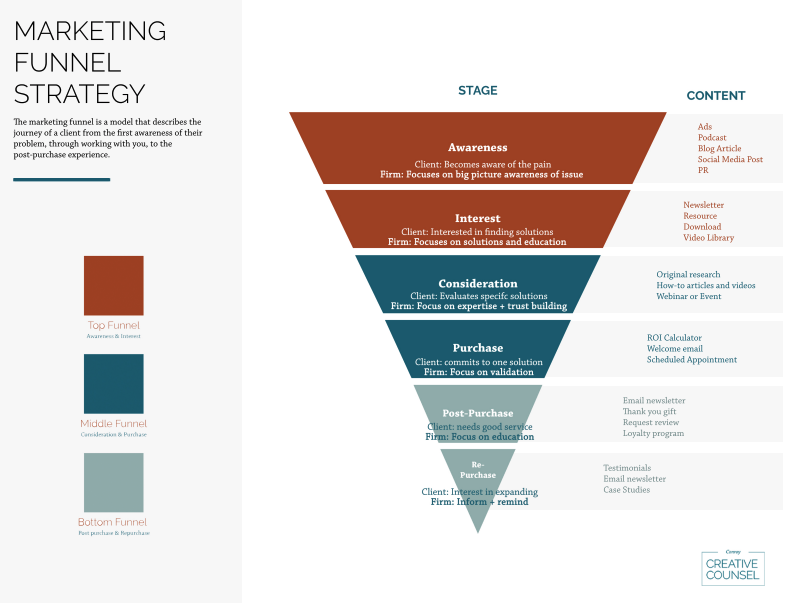In an increasingly saturated legal market with numerous firms vying for a spot on the first page of Google, law firms in the US face a unique set of challenges when it comes to Search Engine Optimization (SEO).
Legal terminology can be complex and often requires careful keyword selection to match the queries of potential clients who might not be familiar with legal jargon. Moreover, law firms must navigate the ethical boundaries of advertising and marketing set by the American Bar Association and other regulatory bodies, ensuring that their legal SEO strategies do not violate these standards.
In this blog, we will delve into some of these challenges and outline various law firm website SEO techniques to help your firm thrive online and hit that coveted top spot on search engine results pages.
We will cover the following areas:
- Understanding Your Target Audience & Their Search Habits
- Keyword Strategy for Law Firms
- Optimizing Website Content
- Technical SEO for Law Firm Websites
- Local SEO Strategies for Law Firms
- Building Backlinks
- Analytics and Measuring Successful SEO
- Staying Updated with SEO Trends and Legal Industry Changes
- How Conroy Creative Counsel Can Help Your Law Firm
1. Understanding Your Audience & Their Search Habits
The first step in optimizing your law firm’s website for search engines is to clearly define who your target clients are. Different types of law firms cater to different client bases. For instance, a personal injury law firm might target individuals seeking compensation for injuries, whereas a corporate law firm would cater to businesses requiring legal advice on corporate matters. Understanding your niche in the legal market is key.
➡️ Identify Your Target Clients:
Consider factors such as:
- Demographics: Age, gender, income level, education, etc.
- Geographical location: Local, regional, national or international clients.
- Specific legal needs: What specific legal challenges or questions do your potential clients have?
➡️ Research Common Search Terms & Questions:
Once you have a clear understanding of your target audience, the next step is to research how they use search engines to find legal services. This involves identifying the keywords and phrases they are likely to use. Common search terms often include specific legal issues (e.g., ‘divorce attorney,’ ‘patent lawyer’) or location-based queries (e.g., ‘lawyers near me’).
Things you can do:
- Use tools like Google Trends to see popular search queries in your area of expertise.
- Analyze frequently asked questions in legal forums or social media groups.
- Consider the language your clients use. Are they using layman’s terms or legal jargon?
➡️ Tools and Techniques for Audience Research:
To effectively research your audience and their search habits, make use of various readily available tools and techniques, such as:
- Google Analytics: Understand the demographics and behaviour of your current website visitors.
- Keyword Research Tools: Use tools like SEMrush, Ahrefs, or Moz to identify high-volume keywords in your practice area.
- Surveys and Client Feedback: Directly ask current or potential clients about their search habits or what terms they used to find your services.
- Competitor Analysis: Examine the SEO strategies of competing law firms. Look at the keywords they target and how they structure their content.
- Social Listening Tools: Platforms like BuzzSumo or Hootsuite can help track what potential clients are saying about legal services in your area.
By combining these tools and techniques, law firms can gain a deep understanding of their target audience and the specific terms and questions they use in search engines. This knowledge is critical for tailoring Search Engine Optimization efforts to meet the needs and behaviors of prospective clients, thereby enhancing the effectiveness of their online presence.
2. Keyword Strategy for Law Firms
Keywords are the cornerstone of SEO, acting as the bridge between what people are searching for and the content you are providing to meet that need.
➡️ The Importance of Choosing the Right Keywords
For law firms, selecting the right keywords is critical because it directly affects how easily potential clients can find their services online. Did you know that 96% of people in need of legal advice do an online search?
Effective keyword selection does the following:
- It increases visibility.
- It improves ranking in search results.
- It drives more targeted traffic to your website.
- It ensures that your firm appears in searches made by users who are most likely to need your legal expertise.
➡️ How to Identify Relevant Keywords for Different Legal Specializations?
Each legal specialization has its unique set of relevant keywords. For instance, a family law firm might focus on keywords like ‘divorce lawyer,’ ‘child custody attorney,’ or ‘family law advice,’ whereas a criminal defense firm would target terms like ‘criminal defense lawyer,’ ‘DUI attorney,’ or ‘legal defense consultation.’
To identify these keywords you need to understand:
- Your services: Clearly define what legal services you offer.
- Client perspective: Consider what terms your clients might use to find these services.
- Specialization-specific terms: Identify terms specific to your area of law.
- Geographical terms: Include location-based keywords if you serve specific areas.
➡️ Long-tail Keywords vs. Short-tail Keywords
In the realm of SEO, understanding the distinction between long-tail and short-tail keywords is crucial for effective digital marketing.
✅ Short-tail Keywords (e.g., ‘divorce lawyer’):
Short-tail keywords are broad, typically one to two words, have higher search volumes, and are more competitive, attracting a wider, but less specific audience.
- Pros: Higher search volumes, broader reach.
- Cons: More competitive, less targeted, lower conversion rates.
✅ Long-tail Keywords (e.g., ‘divorce lawyer in Austin for child custody’):
Long-tail keywords, on the other hand, are specific, often multi-word phrases with lower search volume and less competition, leading to more targeted traffic and higher conversion rates.
- Pros: Less competitive, more targeted audience, higher conversion rates.
- Cons: Lower search volumes, may require more specific content.
Balancing both types is key. Short-tail keywords help in reaching a broader audience, while long-tail keywords attract more specific and often more serious inquiries.
➡️ Tools for Keyword Research and Analysis:
Several tools can assist law firms in identifying effective keywords.
- Google Keyword Planner: Provides search volume data and keyword ideas.
- SEMrush: Offers comprehensive keyword research, competition analysis, and SEO auditing.
- Ahrefs: Known for its keyword explorer and backlink analysis.
- Moz Keyword Explorer: Provides keyword suggestions, SERP analysis, and more.
- AnswerThePublic: Great for finding questions and prepositions related to your primary keywords.
By leveraging these tools, law firms can develop a robust keyword strategy that targets the right audience and maximizes online visibility. This approach is essential for establishing a strong online presence and reaching potential clients effectively.
3. Optimizing Website Content
The content on your law firm’s website serves two primary purposes:
- To inform and engage your audience, and
- To improve your search engine rankings.
➡️ Craft High-Quality and Informative Content:
High-quality content should be informative and accurate, and it should reflect your law firm’s expertise in the legal field.
High-quality content should do the following:
- Provide value to your audience, answering their questions and offering insights into legal processes.
- It must be well-structured, easy to read, and professional, reflecting the credibility of your law firm.
- It should use clear headings, bullet points, and short paragraphs to enhance readability.
➡️ Incorporate Keywords Naturally into Content:
Keywords are essential for SEO, but they need to be incorporated naturally into your content. Keyword stuffing, or overusing keywords, can harm your SEO efforts and turn off potential clients.
Instead, you should do the following:
- Use keywords contextually, ensuring they fit seamlessly into your content.
- Include primary keywords in titles, headings, and the first paragraph if possible, and use them sporadically throughout the content.
- Remember, the primary goal is to maintain the natural flow and readability of the text while subtly optimizing it for search engines.
➡️ Regularly Update Website Content:
Search engines favor websites that are regularly updated with fresh content. This practice indicates that your site is active and provides up-to-date information.
✅ Regular updates include:
- Adding new blog posts.
- Updating existing pages with current information, or
- Publishing news about your firm.
✅ Regular updates achieve the following:
- They help with SEO success.
- They keep your audience engaged, as they have reasons to revisit your website.
- Consistently updated content positions your law firm as an authority in your field, which can build trust with prospective clients.
➡️ Blogging and Article Writing Strategies:
Blogging and writing articles are effective ways to add fresh content to your website. They provide a platform to discuss various legal topics, share insights, and address common questions your potential clients may have.
To maximize the effectiveness of your blog, do the following:
- Focus on Relevant Topics: Write about subjects that are relevant to your practice areas and of interest to your target audience.
- Use a Variety of Formats: Include different types of content such as case studies, how-to guides, legal updates and FAQs.
- Engage with Current Issues: Address current legal issues or news in your blog posts to show that your law firm stays up-to-date.
- Include Calls to Action: Encourage readers to contact your law firm for more information or to schedule a consultation.
- Promote Your Content: Share your blog posts on social media, newsletters, and other platforms to increase visibility.
By following these strategies, your law firm’s website will not only become more favorable in search engine rankings but also serve as a valuable resource for potential clients seeking legal assistance.
4. Technical SEO for Law Firm Websites
Behind-the-scenes technical optimizations ensure that a law firm’s website not only appeals to search engines but also provides a seamless and secure user experience.
➡️ Website Structure and Navigation:
The structure of your law firm’s website plays a crucial role in both user experience and SEO. A well-organized site with a clear hierarchy makes it easier for search engines to crawl and index your content.
Here are some simple tips for website structure:
- Ensure your navigation is intuitive, with a menu that clearly categorizes your practice areas, attorney profiles, testimonials and contact information.
- Utilize breadcrumbs for easy navigation and to reinforce the structure.
- Internally link to relevant pages within your site to facilitate user journey and distribute page authority.
➡️ Mobile Optimization and Responsive Design:
With the increasing use of smartphones for web browsing, mobile optimization is no longer optional.
A mobile-responsive design does the following:
- It ensures that your website adjusts seamlessly to the screen size and resolution of various devices.
- This not only improves user experience but is also a significant ranking factor for search engines, especially after Google’s mobile-first indexing update.
- Test your website’s mobile responsiveness and ensure that features like menus, forms, and CTA buttons work flawlessly on mobile devices.
➡️ Site Speed and Performance Optimization:
Website speed is a critical factor for both SEO and user experience. Slow-loading websites can lead to higher bounce rates and lower rankings in search engine results.
You can optimize your website’s speed by doing the following:
- Compressing images.
- Using caching solutions.
- Minimizing the use of heavy scripts, and
- Choosing a reliable web hosting service.
- Tools like Google PageSpeed Insights can help you analyze your site’s performance and provide recommendations for improvement.
➡️ Secure Your Website with HTTPS:
Security is paramount, especially for law firms that handle sensitive client information.
Securing your website with HTTPS (Hypertext Transfer Protocol Secure) is essential for the following reasons:
- HTTPS encrypts the data transmitted between your website and its visitors, protecting against intrusions.
- Search engines like Google give preference to secure websites, making HTTPS not only a best practice for security but also beneficial for SEO.
- Ensure your website has a valid SSL (Secure Sockets Layer) certificate and that all pages are accessible via HTTPS.
By addressing these technical SEO elements, your law firm’s website will not only offer a better user experience but also improve its chances of ranking higher in search engine results. These improvements signal to search engines that your website is trustworthy, relevant, and committed to providing a quality experience for visitors.
5. Local SEO Strategies for Law Firms
These specialized tactics enhance a law firm’s online visibility within specific geographic areas, ensuring they connect effectively with their local audience.
➡️ The Importance of Local SEO for Lawyers:
Local SEO is a critical component for law firms, especially those serving specific geographic areas or communities. It involves optimizing your online presence to appear in local search results, which is crucial as many potential clients search for legal services within their vicinity.
Local SEO helps with the following:
- It helps your firm to appear in relevant local searches.
- It Increases foot traffic to your physical location.
- It improves your visibility in Google’s Local Pack, Maps, and localized organic search results.
➡️ Optimizing for Google My Business:
Google My Business (GMB) is a powerful tool for enhancing your local online presence. It allows you to manage how your law firm appears across Google services, including Maps and local search results.
To optimize your GMB listing do the following:
- Claim and Verify Your Listing: Ensure that your law firm’s listing is claimed, verified, and up-to-date.
- Complete Every Section: Fill out all the information in your GMB profile, including firm name, address, phone number, business hours and services offered.
- Use Accurate Categories: Choose appropriate categories that best describe your law firm’s specializations.
- Add Photos and Videos: Include professional images of your office, team, and any relevant legal resources.
- Keep Information Consistent: Make sure your NAP (Name, Address, Phone Number) information is consistent across the web.
➡️ Local Citations and Directories:
Local citations are mentions of your law firm on other websites, such as local business directories, legal-specific directories, and chamber of commerce pages. They play a crucial role in local SEO by reinforcing your geographic location and business legitimacy.
Ensure that your firm is listed in relevant local and legal directories and that the information is accurate and consistent. This includes sites like Yelp, Yellow Pages, Avvo, and FindLaw.
➡️ Gathering and Managing Online Reviews:
Online reviews significantly impact local search rankings and can influence potential clients’ decisions.
You can do the following:
- Encourage satisfied clients to leave positive reviews on your Google My Business profile and other relevant platforms.
- Actively monitor these reviews and respond professionally to both positive and negative feedback.
- A proactive approach to managing online reviews can enhance your reputation and credibility, both in the eyes of potential clients and search engines.
By implementing these local SEO strategies, your law firm can improve its visibility in local search results, making it easier for potential clients in your area to find and choose your legal services.
6. Building Backlinks
Backlinks, also known as inbound links, are links from other websites to your site. They are among the most significant factors for achieving high rankings in search engine results.
➡️ The Role of High-Quality Backlinks in SEO:
Backlinks from reputable and relevant sites act as endorsements, signalling to search engines that your content is valuable and authoritative. This can lead to improved visibility and higher rankings in search results. However, it’s not just about the quantity of backlinks; the quality and relevance of these links are crucial.
➡️ Strategies for Acquiring Quality Backlinks:
- Create High-Quality Content: The foundation of earning backlinks is to produce informative, engaging, and shareable content. This could include legal guides, case studies, or insightful blog posts.
- Legal Directories and Listings: Ensure your law firm is listed in reputable legal directories. These are often authoritative sites and can provide valuable backlinks.
- Networking and Partnerships: Build relationships with other legal professionals, industry influencers, and related businesses. They might link to your content if it adds value to their audience.
- Local Community Engagement: Participate in or sponsor local events, charities or educational programs. These activities can result in backlinks from local news sites, blogs and community pages.
- Link Reclamation: Identify mentions of your law firm on the internet that are not linked to your site and reach out to the webmaster to request a link.
➡️ Guest Blogging and Collaboration with Legal Websites:
Guest blogging is a potent strategy for acquiring quality backlinks.
By contributing articles to reputable legal blogs or websites, you can:
- Establish your expertise in a specific legal area.
- Reach a broader audience.
- Earn a backlink from an authoritative site in your industry.
Collaborate with legal websites and blogs that align with your area of expertise. Make sure the content you provide is valuable and relevant to their audience.
➡️ Avoiding Black Hat SEO Tactics:
While building backlinks, it is essential to avoid black hat SEO tactics. These include purchasing links, excessive link exchanges, or using private blog networks.
- Such tactics can lead to search engine penalties and harm your website’s reputation.
- Focus instead on ethical, white-hat SEO practices that build your online presence over time.
- This includes creating valuable content and building relationships with reputable websites in your industry.
By focusing on these strategies, your law firm can build a strong backlink profile that boosts your SEO efforts, enhances your online authority, and ultimately drives more traffic to your website.
7. Analytics and Measuring Success
To effectively measure the success of your SEO efforts, you need the right tools. These tools can provide insights into how your website is performing, how visitors are interacting with your content, and where improvements can be made.
➡️ Key Tools for Tracking Website Performance:
- Google Analytics: Offers comprehensive data on website traffic, user behavior, conversion rates, and more.
- Google Search Console: Provides insights into how your site appears in search results, including search queries, click-through rates and any indexing issues.
- SEMrush or Ahrefs: These tools offer advanced analytics on keyword rankings, backlink profiles, and competitor analysis.
- Moz Pro: Useful for tracking keyword rankings, site audits and page optimization insights.
➡️ Understanding Key Metrics and KPIs:
To evaluate the effectiveness of your SEO strategy, you need to focus on key metrics and KPIs (Key Performance Indicators) such as:
- Organic Traffic: The number of visitors coming to your site from search engines.
- Keyword Rankings: Positions of your target keywords in search results.
- Bounce Rate: The percentage of visitors who leave your site after viewing only one page.
- Conversion Rate: The percentage of visitors who take a desired action (e.g., filling out a contact form).
- Backlink Quality and Quantity: The number and quality of backlinks to your site.
- Page Load Time: How quickly your site pages load.
➡️ Adjusting Your Strategy Based on Analytics:
Analytics should inform and guide your SEO strategy. For instance:
- If certain keywords aren’t driving traffic, consider refining your keyword strategy.
- If specific pages have high bounce rates, evaluate the content and user experience on those pages.
- Regularly review your analytics to identify trends, successes and areas for improvement.
- Use this data to make informed decisions and adjust your SEO strategy for better results.
➡️ Regular SEO Audits:
Conducting regular SEO audits is essential to ensure your website is optimized effectively for Google and other search engines.
Audits help with the following:
- Audits can reveal technical issues (like broken links or slow-loading pages), on-page SEO opportunities (such as content enhancements or meta tag improvements), and off-page SEO aspects (like evaluating backlinks).
- Tools like SEMrush, Moz, or Ahrefs can assist in performing comprehensive SEO audits.
- Regular audits allow you to keep your website updated with the latest SEO best practices and adapt to any changes in search engine algorithms.
By utilizing these analytics tools, understanding the key metrics, continually adjusting your strategy, and performing regular SEO audits, your law firm can maintain an effective, dynamic SEO strategy that drives traffic and increases client engagement.
8. Staying Updated with SEO Trends & Legal Industry Changes
SEO is a dynamic field, with search engines constantly updating their algorithms to improve the user search experience. Staying informed about these changes is crucial for maintaining and improving your law firm’s search engine rankings.
➡️ Adapting to Changes in the Legal Industry:
The legal industry is also subject to change, influenced by new laws, regulations, societal shifts, and technological advancements. Your online content, including blog posts, articles, and service descriptions, should reflect these changes. This not only enhances your firm’s image as a current and knowledgeable authority in the field but also ensures that your website remains relevant and useful to your audience.
➡️ Resources for Ongoing Learning and Development:
To stay updated with SEO and industry changes, consider utilizing a variety of resources, such as:
- SEO Blogs and Websites: Follow reputable SEO blogs like Moz Blog, Search Engine Journal, or The WP SEO Show for the latest in SEO strategies and updates.
- Online Courses and Webinars: Platforms like Udemy, Coursera, and LinkedIn Learning offer courses on SEO and digital marketing.
- Legal Industry Publications: Stay informed about legal industry trends through publications like The American Lawyer, ABA Journal, or Law.com.
- Conferences and Networking Events: Attend SEO or legal industry conferences and networking events to learn from experts and peers.
- Social Media and Forums: Follow industry leaders on social media and participate in forums like Reddit’s SEO community or legal discussion groups.
- Newsletters and Podcasts: Subscribe to SEO and legal industry newsletters and podcasts such as the Counsel Cast Podcast series for insights on the go.
By leveraging these resources, you can ensure that your law firm’s SEO strategy not only complies with the latest best practices but also aligns with current trends and changes in the legal industry. This ongoing learning and development are crucial for maintaining a competitive edge in the digital landscape.
9. How Conroy Creative Counsel Can Help Your Law Firm
Conroy Creative Counsel is a specialist law firm marketing agency. We offer a range of services to assist law firms in enhancing their SEO and overall digital marketing strategies.
- Website Design & Development: We create user-friendly, visually appealing and SEO-optimized websites.
- SEO & PPC: We specialize in optimizing websites for better search engine ranking and managing pay-per-click advertising.
- Content Development: We provide regular, high-quality content to showcase a law firm’s expertise.
- Custom Photography & Video: We can enhance a law firm’s online presence with professional imagery and video content.
- Podcast Production: We offer unique ways to engage with audiences through podcasts.
- Social Media: We manage and enhance a firm’s social media presence for better engagement and reach.
- Technical Services: We ensure that websites remain updated, secure and reliable.
Contact Us Today
Are you looking to enhance your law firm’s website optimization and boost your online rankings?
Contact us today for expert assistance in elevating your digital presence and connecting more effectively with your prospective clients.
Make Conroy Creative Counsel your trusted partner in achieving your law firm’s digital marketing goals and ensuring an impactful online presence!



















